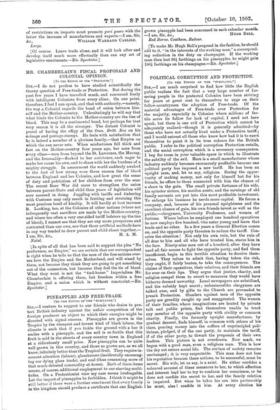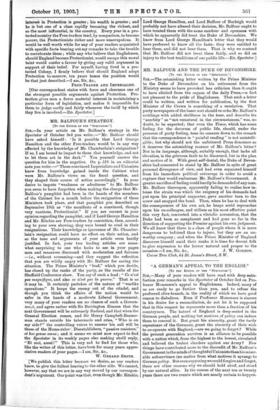POLITICAL CORRUPTION AND PROTECTION. [TO THE EDITOR OP THE "SPECTATOR:1
am much surprised to find how little the English public realises the fact that a very large number of far.
seeing people in the protected Colonies have been striving for years at great cost to themselves to urge on their fellow-countrymen the adoption of Free-trade. Of the material advantages of Free-trade over Protection for the majority, especially in Colonies where millions of fer- tile acres lie fallow for• lack of capital, I need not here
speak, but there is one evil of Protection which cannot be adequately realised—though it is generally admitted—by those who have not actually lived under• a Protective tariff; and I would entreat all those who know how bad it is to exert themselves to paint it in its true colours for the British public. I refer to the political corruption Protection entails, and the social corruption which is a necessary consequence. I beg for room in your valuable space in which to illustrate the subtilty of the evil. Here is a small manufacturer• whose industry suddenly becomes enormously profitable because one political party has imposed a new tariff. He has been an upright man, and, let us say, religious. Seeing the oppor- tunity of making money, not only for himself but for his friends, he offers to those connected with him the chance of a share in the gain. The small private fortunes of his wife, his spinster sisters, his maiden aunts, and the earnings of old family servants are put into this most profitable investment. To enlarge his business he needs more capital. He forms a company, and, because of his personal uprightness and the excellent chance of gain, his own friends invest as well as the public,—clergymen, University Professors, and women of fortune. Where before he employed one hundred operatives he now employs five hundred, who enter young and learn that trade and no other. In a few years a General Election comes on, and the opposite party threaten to reduce the tariff. Con- ceive the situation ! Not only his own ruin, but the ruin of all dear to him and all who have trusted him, stares him in the face. Ninety-nine men out of a hundred, after they have used all fair means to fight the opposite party, and find them insufficient, begin in this terrible situation to deceive them. selves. They refuse to admit that, having taken the risk, they ought, if fairly beaten, to take the consequences. The claims of their operatives, their relatives, and their friends are for ever on their lips. They argue that justice, charity, and religion compel them to resort to measures they would have hitherto deemed unworthy. Local newspapers are subsidised, and the subsidy kept secret ; unbusinesslike clergymen are talked over•, and by gifts to the Church are persuaded to preach Protection. Slanders against men of the opposite party are greedily caught up and exaggerated. The women of their families, whose imaginations are heated by private talk and public prints, find themselves unable to treat any member• of the opposite party with civility or common charity. Finally, the formerly upright manufacturer, by gradual descent, finds himself, in common with others of his class, pouring money into the coffers of unprincipled poli- ticians, pledged, if of the one party, ,to maintain the tariff, if of the other party, to thwart the proposals of their own leaders. This picture is not overdrawn. Now mark, we began with a good man, even a religious man. This is how the dry rot enters social life. The surface of society remains unchanged ; it is very respectable. This man does not lose his reputation because these actions, to be successful, must be secret. His wife, let us say, is a saint. He either• confides a coloured account of these measures to her, to which affection and interest lead her to try to conform her conscience, or he does not confide the secret to her•, and the family relation is impaired. But when he takes his son into partnership he must, alas ! confide in him. At every election his interest in Protection is greater ; his wealth is greater ; and he is but one of a 0.19.88 rapidly becoming the richest, and so the most influential, in the country. Every year in a pro- faded country the Free-traders tend, by comparison, to become poorer, the Protectionists richer and more unscrupulous. It would be well worth while for any of your readers acquainted with specific facts bearing out my remarks to take the trouble to corroborate them ; while any who believe that Englishmen, should England become Protectionist, would escape this moral taint would confer a favour by giving any valid argument in support of their belief. For myself, having lived in a pro- tected Colony, I firmly believe that-should England adopt Protection to-morrow, ten years hence the position would be that just described.—I am, Sir, &c.,
FREE-TRADER AND IMPERIALIST.
[Our correspondent states with force and clearness one of the strongest possible arguments against Protection. Pro- tection gives men a fierce material interest in maintaining a particular form of legislation, and makes it impossible for them to judge coolly and fairly whenever the tariff by which they live is involved.—ED. Spectator.]















































 Previous page
Previous page